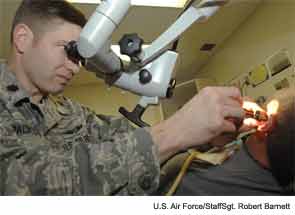
Explore This Issue
January 2013Fred Minnick spent more than a year in Iraq as a U.S. Army public affairs photojournalist. He survived a near-direct hit by a rocket-propelled grenade but lost a lot of his hearing. Today, at the age of 34, Minnick struggles to hear people in crowds and is subject to near-constant ringing in his ears. His auditory issues affect both his professional and his personal life.
“You know how if someone has a stroke, they slur a lot? That’s what a lot of people sound like to me. I have a hard time understanding people on speakerphone or on convention floors. I’ll interview someone on the phone and have no idea what the heck they’re saying,” said Minnick, who is also the author of Camera Boy: An Army Journalist’s War in Iraq (Hellgate Press, 2010).
His colleagues and friends don’t always understand and appreciate his hearing difficulty, said Minnick, and that can lead to interpersonal problems. “People with hearing loss … suffer a lot of ridicule and misunderstanding,” Minnick said. “We also misunderstand people. Sometimes it sounds, to us, like someone is being aggressive, and that’s not the case at all. It’s actually a case of them trying to talk loud because they know we can’t hear.”

Unfortunately, Minnick is not alone. According to the Department of Defense Hearing Center of Excellence, 1.5 million veterans suffer from service-related auditory damage. Tinnitus and hearing loss are the most common service-related disabilities, consistently rated No. 1 and No. 2 on the Veterans Benefits Administration Annual Benefits Report distributed by the U.S. Department of Veterans Affairs. And, the number of service-connected hearing injuries seems to be increasing. According to the Hearing Center of Excellence, reports of auditory injuries are rising 13 to 18 percent annually.
Those injuries affect military readiness, because those who can’t hear well miss out on important environmental cues and warning signs, and military members and society experience its effects long after troops resume civilian life. “A lot of people who get out of the military are apt to go into a profession that requires communication skills, like a policeman or fireman,” said Kurt Yankaskas, program manager of the Office of Naval Research’s Noise-Induced Hearing Loss effort in Arlington, Va.
Leave a Reply